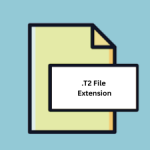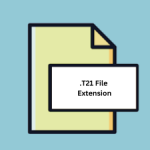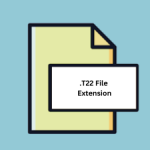.SCOREBOARD File Extension

VMware Virtual Machine Stats File
| Developer | VMware |
| Popularity | |
| Category | Data Files |
| Format | .SCOREBOARD |
| Cross Platform | Update Soon |
What is an SCOREBOARD file?
In the realm of virtualization technology, where the digital landscape continues to evolve, the .SCOREBOARD file extension stands as a significant entity.
These files, associated with VMware virtual machines, play a crucial role in capturing and storing essential performance statistics.
They serve as a repository for various metrics, offering insights into the health, efficiency, and usage of virtualized environments.
More Information.
The inception of .SCOREBOARD files trace back to the need for detailed performance monitoring within virtualized environments.
VMware recognized the importance of granular insights into resource utilization, CPU usage, memory consumption, disk activity, and network performance.
As a response, they devised the .SCOREBOARD file format to systematically record and analyze these metrics over time.
.SCOREBOARD files were primarily intended for internal diagnostic purposes within VMware environments.
Their utility quickly expanded as administrators realized their potential for capacity planning, troubleshooting, and optimization of virtual infrastructures.
Origin Of This File.
The .SCOREBOARD file extension finds its origins within the VMware ecosystem, a pioneering force in virtualization solutions.
VMware, renowned for its robust virtual machine infrastructure, introduced this file format to provide administrators and users with comprehensive visibility into the performance of their virtualized environments.
By capturing vital statistics, .SCOREBOARD files enable informed decision-making and proactive management of virtualized resources.
File Structure Technical Specification.
The structure of .SCOREBOARD files is designed to accommodate a wealth of performance data while maintaining efficiency and accessibility.
These files typically employ a structured format, often based on XML or similar markup languages, to organize statistical information hierarchically.
At its core, a .SCOREBOARD file contains a comprehensive array of performance metrics captured at regular intervals.
These metrics may encompass CPU utilization percentages, memory usage statistics, disk I/O operations, network throughput, and other relevant parameters specific to virtualized environments.
To facilitate easy interpretation and analysis, .SCOREBOARD files often include metadata such as timestamps, VM identifiers, and contextual information about the captured metrics.
This metadata enables administrators to correlate performance data with specific virtual machines, periods, or operational events, facilitating targeted analysis and troubleshooting.
How to Convert the File?
Converting .SCOREBOARD files can be challenging due to their proprietary nature and the specialized performance data they contain. There are a few approaches you can explore:
- Export to CSV or Excel: Some VMware management tools may offer the option to export performance data from .SCOREBOARD files into CSV (Comma-Separated Values) or Excel formats. This allows you to convert the data into a more universal format that can be easily imported into other applications or platforms for further analysis.
- Third-Party Conversion Tools: Look for third-party software or utilities designed specifically for converting .SCOREBOARD files into alternative formats. While such tools may be limited in availability, they could provide a solution for your conversion needs.
- Custom Scripting: If you have programming or scripting skills, you may be able to develop a custom script to parse and extract data from .SCOREBOARD files, converting it into a format of your choice. This approach offers flexibility but requires technical expertise.
- Virtualization Management Platforms: Explore virtualization management platforms or software suites that support importing and exporting performance data from VMware environments. These platforms may offer built-in conversion capabilities or integrations with third-party tools for data transformation.
- Consult VMware Documentation: Check the official documentation and resources provided by VMware for any guidelines or recommendations on converting .SCOREBOARD files. VMware may offer insights or tools specifically tailored for handling these files.
- Professional Services: If your conversion needs are complex or require specialized expertise, consider engaging professional services or consulting with experts familiar with VMware environments. They can provide guidance and assistance tailored to your specific requirements.
Advantages And Disadvantages.
Advantage:
- Granular Performance Insights: .SCOREBOARD files provide administrators with granular visibility into the performance of individual virtual machines and the underlying infrastructure. This level of detail enables proactive monitoring, optimization, and troubleshooting.
- Historical Analysis: By capturing performance metrics over time, .SCOREBOARD files facilitate historical analysis and trend identification. This historical perspective is invaluable for capacity planning, performance forecasting, and identifying long-term usage patterns.
- Diagnostic Capabilities: In the event of performance issues or anomalies, .SCOREBOARD files serve as invaluable diagnostic tools. Administrators can analyze historical performance data to identify root causes, pinpoint bottlenecks, and implement remedial measures effectively.
Disadvantage:
- Storage Overhead: Storing extensive performance data in .SCOREBOARD files can impose storage overhead, particularly in environments with large numbers of virtual machines and frequent data collection intervals. Administrators must carefully manage storage resources to avoid excessive consumption.
- Processing Complexity: Analyzing and interpreting .SCOREBOARD files require specialized tools and expertise. Extracting actionable insights from voluminous performance data demands sophisticated analytical techniques and may pose challenges for inexperienced users.
- Compatibility Constraints: .SCOREBOARD files are proprietary to VMware virtualization environments, limiting their compatibility with other platforms and tools. Interoperability issues may arise when attempting to integrate .SCOREBOARD data with non-VMware solutions or third-party management platforms.
How to Open SCOREBOARD?
Open In Windows
Utilize VMware vSphere Client or VMware Workstation, both of which are compatible with Windows operating systems.
These tools provide comprehensive support for managing VMware virtual machines, including the ability to open and analyze .SCOREBOARD files.
Open In Linux
Use VMware’s command-line utilities like esxcli or vicfg within Linux environments to interact with .SCOREBOARD files.
Alternatively, explore third-party virtualization management tools with Linux compatibility, such as Proxmox VE, which may offer support for accessing and analyzing VMware performance data.
Open In MAC
VMware Fusion is a virtualization platform specifically designed for macOS. You can use VMware Fusion to manage VMware virtual machines and open .SCOREBOARD files on macOS systems.
The graphical interface of VMware Fusion provides tools for analyzing performance metrics and troubleshooting virtualized environments.
Open In Android
Opening .SCOREBOARD files on Android is not directly supported. You can use remote management apps provided by VMware or third-party vendors to monitor and manage.
VMware virtualized environments from Android devices, accessing performance data without directly opening .SCOREBOARD files.
Open In IOS
Opening .SCOREBOARD files on iOS directly is not supported. However, you can use remote management applications provided by VMware or third-party vendors to monitor and manage.
VMware virtualized environments from iOS devices, accessing performance data without directly opening .SCOREBOARD files.
Open in Others
Explore third-party virtualization management solutions and performance monitoring tools that offer compatibility with .SCOREBOARD files.
Look for platforms that provide features for importing, analyzing, and visualizing performance data from VMware environments.
Examples include Zabbix, Nagios, and SolarWinds Virtualization Manager, which offer cross-platform support and may provide options for handling .SCOREBOARD files effectively.













